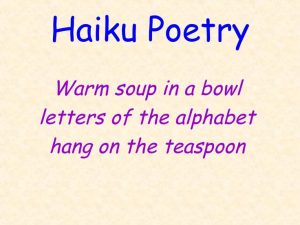
Timeline Of Nick’s Life In Poetry
There are poets and visionaries—souls who write to reveal the truth hidden in the ordinary,
Check out our store for the latest sales and promotions

Starting a haiku writing journey is like opening a window to the subtle beauty of the world. Haiku’s straightforward structure—three lines with (or without) a 5-7-5 syllable pattern—offers novices a warm canvas on which to paint rich feelings and vivid pictures. However, haiku’s fundamental meaning transcends its form; it is about encapsulating ephemeral moments, natural echoes, and the subtleties of human existence.
At the Writers House in Waterfront South, Camden, NJ, we believe in nurturing this poetic exploration. Through our workshops and sessions, we’ve witnessed how selecting the right themes can ignite creativity and foster a deeper connection with the art of poetry. Whether you’re a teacher aiming to introduce haiku to students or an aspiring poet seeking inspiration, understanding haiku themes for beginners is your first step towards crafting resonant and meaningful verses.
Nature is one of the most beloved themes for beginner haiku writers—and for good reason. Haiku has its roots in seasonal observation, where the poet takes a moment to honor the quiet power of the world around them. Think blooming cherry blossoms, falling leaves, or a sudden gust of wind across still water.
For beginners, nature haiku offers a safe and infinite playground. You don’t have to be a botanist or meteorologist—just pay attention. A walk outside becomes a poem waiting to be written. Get inspired by nature-themed poetry walks, where each step is an opportunity to pause, breathe, and notice the poetry of real life.
Whether you’re watching birds at a park or feeling the first snowflake on your skin, let nature speak through you. These moments make writing accessible and meaningful from the start.
Every season tells a tale. Rebirth occurs in the spring. Summer suggests freedom. Autumn evokes sentimentality. Winter hints at loneliness. These seasonal feelings provide strong backgrounds for your haiku when you first begin composing them. Seasonal haiku are emotional snapshots of life as it unfolds around us, and they are more than just weather reports.
You can become more aware of your surroundings and the passing of time by writing seasonally. Young or inexperienced poets will find this extremely useful as it allows them to match their work to the world beyond their window. Imagine the inspiration that comes from describing the faraway murmur of cicadas in the sweltering July heat or the crunch of October leaves.
If you’re unsure where to start, start writing with these theme ideas tied to seasons: cherry blossoms (spring), ocean waves (summer), harvest moons (fall), or first frost (winter). These themes are timeless, and each one opens a new doorway into poetic self-expression.
Haiku is based on nature and the seasons, but it also draws from your own experiences. It is common for novices to disregard their own memories as valuable resources. However, the emotional truth that haiku lives on can be found in that quiet coffee time with a friend or in the distant laughter of a child.
Haiku’s brilliance comes in its ability to capture a single, unvarnished moment. You only need a true narrative, nothing fancy. Try writing about your feelings when you woke up this morning, the sound of your childhood neighborhood, or the scent of your grandmother’s food.
As your writing evolves, you’ll notice how your themes start to shift and deepen. Just like one of our longtime community poets, Nick, whose work began with simple nature observations and grew into meditations on grief and joy—you’ll discover how Nick’s themes evolved, and how yours will too. The haiku form grows with you, reflecting your inner world as much as the outer one.
Haiku is not just for solitary writing—it thrives in community. Teachers, youth mentors, and workshop leaders have discovered the power of beginner haiku themes in educational settings. When you bring poetry into a classroom or group, you give everyone a safe, expressive space.
Whether you’re working with teens or adults, use popular haiku topics like the senses, emotions, weather, or local landmarks. These relatable themes make haiku writing approachable and fun. Use visual aids, go outside, or read classic haiku to get things going. Let students write about what they see, feel, or remember.
Want to dig deeper? Find themed haiku collections to guide your writing, which can spark fresh ideas and elevate classroom discussions. These anthologies serve as both inspiration and instruction, offering real examples of how few words can say so much. This is also a great way to introduce structure and voice, without overwhelming new writers.
Though it may appear to be a silent art form, when cultivated in authentic environments, haiku is resonant with meaning. We witness firsthand how novice poets relate to haiku through common experiences and stories at the Writers House in Camden. For young brains and underrepresented voices in particular, inspiring real-world poetry programs are essential to fostering a lifelong love of writing.
Every writing workshop, whether at community centers, schools, or open mic nights, is anchored by beginner-friendly themes like identity, family, and seasons. Deeper expression and confidence eventually result from the familiarity and comfort these themes foster.
Would you like to attempt this with your school or group? We will customize each session with beginner haiku themes to suit your children where they are. You can arrange a haiku workshop for your school. It is about using words to connect, empower, and heal—it is not just about writing.
Haiku writing is more than just mastering a poetic form; it is about observing the world and making a strong, sincere connection with it. The key to making that first step feel less daunting and more gratifying for novices is selecting the appropriate topics. There are many topics to consider, ranging from seasonal and nature haiku to personal recollections and social issues.
Thus, pause, inhale, and write down your feelings. These subjects can help you find your creative voice, whether you are writing in a classroom, with a friend, or by yourself. Think of this resource as a road map. When you feel stuck, go over it again. Give it to someone who is interested in poetry.
Do not be afraid to explore our poetry and creative learning hub if you are prepared to move on. The Writers House community is always welcoming, providing inspiration, love, and a space where your lyrical journey can really start.

There are poets and visionaries—souls who write to reveal the truth hidden in the ordinary,

New Jersey’s Camden. A city that had been a titan of shipbuilding and industry, more

Words that will reverberate over time were once written by a quiet voice amid the
Copyright © 2025 Nick VIrgilio Haiku Association. All rights reserved.

Alfred taught English to junior and senior high school students in New Jersey and Massachusetts prior to working for the municipal government of the City of Camden, New Jersey. He began working with the City of Camden Department of Planning & Development, Division of Housing Services, as a Cost Estimator for Property Improvement in 1984.
He spent the next thirty-eight years working in both the Division of Housing Services, and the Finance Department Bureau of Grants Management, helping the City administer state and federally funded affordable housing projects in Camden.
Alfred spent ten years working with the Bureau of Grants Management, where he reviewed and evaluated grant applications and proposals for funding from non-profit and for- profit housing developers. These agencies included St. Joseph’s Carpenter Society, Heart of Camden, Camden County OEO, Habitat for Humanity,
Camden Lutheran Housing, RPM Development and others. He also worked with social service agencies such as Dooley House, Respond Inc., Sikora House, Center for Family Services, and Volunteers of America, that applied for grant funding.
He also played a significant role in the planning and implementation of the Annual Consolidated Plan grant application submitted to the Department of Housing and Urban Development each year. The Bureau holds an annual grant funding seminar along with public meetings and technical assistance sessions concerning the C-Plan.
Working for the City of Camden Division of Housing Services Alfred also served as the coordinator of the federal funded HOPWA housing Program for 14 years.
HOPWA funds provided safe, affordable, secure, housing for persons with HIV/AIDS, by issuing housing vouchers to their participants. He managed the delivery of services to 80-90 clients a year, covering Camden, Burlington and Gloucester counties.
During his time working for the City of Camden Mr. Dansbury was a member of the CPAC Homeless Network Planning Committee, the Local Law Enforcement Block Grant Advisory Committee and United Neighbors of Whitman Park.
Outside of his work with the City of Camden, Alfred worked as an Adjunct Instructor of Reading Skills and Writing Skills at Camden County College, teaching at both the Camden and Blackwood campuses. In 2022 Alfred published,
“The Strength of Courage” a novel he embarked on as a graduate student in Rowan University’s M.A. in Writing program in 2014-2018.
He earned a Bachelor of Arts in English and Journalism from Rutgers University, a Master’s of Arts degree in Business Administration from Eastern University, a Master’s of Arts in Education from Eastern Michigan University and a Master’s of Arts in Writing from Rowan University.